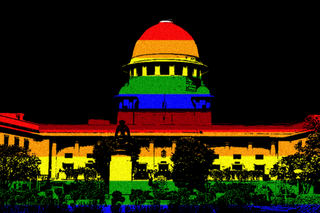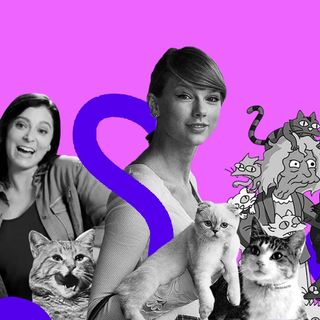
The Marriage Equality Hearings: Week 2
On The Swaddle’s behalf, Hetvi Kamdar sat in on week 2’s hearings and asked petitioner Utkarsh Saxena a few questions about the salient points.

The ongoing Supreme Court hearings on marriage equality petitions mark the first significant case in the Indian judiciary that’s being live-streamed to the nation. With all eyes on the outcome of the case, on behalf of The Swaddle, Hetvi Kamdar sat in on week 2’s hearings and asked petitioner Utkarsh Saxena, who is also a lawyer on this case, a few questions about the salient points.
The Swaddle: Some have argued that recognizing marriage equality can cause an upheaval in pre-existing gendered laws, including those on divorce, alimony, and succession. Could you shed some light on how other countries have chosen to deal with this kind of amendment and its impact?
Utkarsh Saxena: So the petitioners are saying that those parts of the Special Marriage Act which discriminate and exclude queer people are the ones that should be interpreted in a favorable way to include them. That means that those parts of the Act that do not discriminate and exclude queer relationships are not within the ambit of our challenge. So when people say that this is going to affect the Domestic Violence Act or divorce specific provisions that are gendered and specifically granted to women, our argument is that they don’t even apply to us. We’re not even challenging those, right? The very purpose of those provisions is for heterosexual relationships and to grant protections to women in heterosexual relationships. So therefore, they’re not a part of our challenge.
TS: So, you’re not challenging the other laws at all. You don’t want any amendment to be made to laws apart from the Special Marriage Act?
Utkarsh Saxena: So, the way we are saying this is that if you interpret the Special Marriage Act in a way that’s agnostic of gender or sexual orientation, it sort of becomes the key or the index to all other laws, right? Because whether it’s the Income Tax Act or the Adoption Act or any of the other acts where there are allied rights, they don’t say it has to be a marriage between a man and a woman, right? Those words are not there. The words usually there are ‘spouse’. So for instance, in the Income Tax Act, if you are seeking exemptions for gift tax, it just says money transferred to a spouse is not subject to gift tax. Even in the case of adoption, only a legally married couple can adopt. So all that we are saying is that if you change this index – which is the Special Marriage Act, which determines who has the status of a legally married couple – all other rights will naturally flow from that Act, and therefore don’t require express interpretations or amendments in all the other related legislations.
TS: The BCI issued a statement mentioning that the legislature was more competent to handle this case because it is supposed to be “truly reflective of the will of the people.” It also went on to state that “more than 99.9% of people of the country are opposed to the idea of same-sex marriage in our country.” While there’s a lack of evidence to support this statement, does it also indicate a lack of solidarity within the legal community? Was this statement a setback in any way, and what is the significance of the Indian judiciary addressing and adjudicating on this issue?
Utkarsh Saxena: Bar Council of India is an organization that’s responsible for the welfare of lawyers in the legal profession. This is a constitutional matter regarding the interpretation of a statute. The BCI has no standing. This has never happened before. And the fact that it had to take this step is quite unfortunate. But fortunately, this didn’t come up in court. This doesn’t deserve to be given any importance. This is the Bar Council of India saying something without being a party to the litigation. It has the right to become a party if it believes that it is affected. It can file an impeachment, it can be an intervener, it can take all of those steps, but staying out of the litigation while commenting on the Supreme Court of India, which is on a constitution bench hearing this matter, is not appropriate. So this is definitely not within the jurisdiction of the Bar Council of India. In fact, the Supreme Court Bar Association has issued a statement in response to the BCI statement, criticising them for commenting on the constitution bench proceedings.
As far as the jurisdiction of the Supreme Court is concerned, I think the petitioners have repeatedly said that there is no question of making a law here. A law already exists. It is called the Special Marriage Act. The question is, can a law selectively grant rights to some groups of people while excluding other groups of people, which is a classic Article 14 discrimination challenge. And we have gone with that challenge to the court. It is very much the court’s domain to determine the constitutional validity of a law. And the court, in our view, will not be discharging its duty if it does not engage in a question of this sort. The parliament can’t determine whether its own law is discriminatory or not – that would almost be a conflict of interest. So this is how the constitutional scheme is. This is the role of the Supreme Court. This is where, when our fundamental rights are violated, we get the opportunity to approach the court for it. And this is why the court has formed a constitution bench and is hearing the matter.
The third point on this statistic of 99.9% – there’s a lot of research that shows that almost 5-10% of the population is queer. This is a biological thing, this is not a class thing or a country-specific thing… So I’m pretty sure it’s not 0.1%. Also, I don’t think this represents a lack of solidarity in the legal profession because you must have seen the outrage that came from the legal profession when the Bar Council made the statement. The Bar Council and its organizational structure right now is not the most democratic. It has been severely criticized for the fact that it’s not representative, it has not held elections. So, this was unexpected, has no legal standing, created some noise in the media, but now should be quickly put to rest, because it has no impact on the ongoing litigation before the Supreme Court.
TS: Statements comparing homosexuality and queerness at large to criminal offences of incest and bestiality were not only made in court, but there’s also a general perception around these comparisons and the question of ‘where would we draw the line.’ These connotations skew our understanding of gender identity and sexuality. How do you respond to them?
Utkarsh Saxena: I think it’s important to note that live streaming is a new experience for everyone – for the court, for the lawyers, for the population, for the media at large that’s observing this. And a lot of things that are said in court are said because the court is performing a specific function. So judges are meant to ask questions to both sides, to play devil’s advocate with both sides.They’re pushing both sides to get the best case out of them, to determine what’s the weakest point in their arguments, and to push them to develop them further. The court is just doing its job of asking questions. Last week, the petitioners were arguing. So that’s why the court was engaging with a lot of their arguments. Now the government is arguing and the court is engaging with their arguments. Let’s allow the court to do its job. It shouldn’t be that, you know, the judges now start thinking before they ask questions because of ramifications in the media. This is an excellent project as far as transparency is concerned. But it should not come in the way of the proceedings of the court. So I would urge everyone not to make too much of the questions of the court.
As far as the question of arguments around incest and others that are made on social media, these were made around the 377 litigation also. Unfortunately, when they come to oppose this, one of the standard arguments is, ‘What else will come afterwards, because this is apparently the gateway to that’. Sometimes I feel like people are genuinely thinking these things, so allowing them to stay there and not engaging with them would be harmful. There wouldn’t be any progress, or growth or an evolution on their views. It’s only when they’re articulated that it’s evident why they’re off, and people have the opportunity to explain to them why they’re off, is when a healthy social discourse happens. To get to a progressive world, if the path leads to some regressive conversations, I sometimes feel like maybe that is the way to go about it.
Hetvi is an enthusiast of pop culture and all things literary. Her writing is at the convergence of gender, economics, technology and cultural criticism. You can find her at @hetviii.k.
Related


The Link Between Neurodivergence and Queerness, Explained
